The diseases we research impact people's lives
Our researchers are dedicated to improving lives through neuroscience. Thanks to the generosity of all our donors, that we can continue our legacy of ground-breaking research.
Brazil Family Foundation
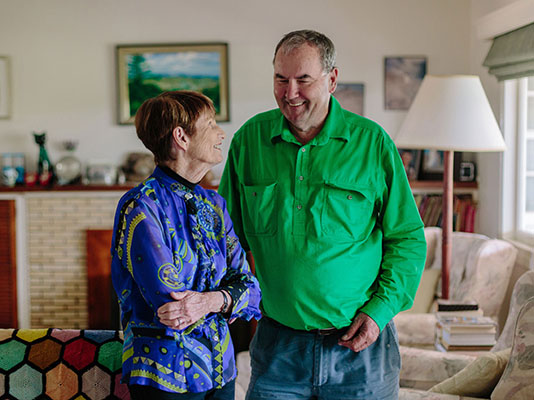
Recognising stroke and motor neurone disease (MND) had only limited treatment options and no cures prompted Lyn and Bobbie Brazil to establish the Brazil Family Program for Neurology in 2017. This enabled us to recruit world-leading researchers and support four laboratories.
Dr Adam Walker’s laboratory has defined some of the early triggers of MND to enable the best targeted approaches for therapies and identified ways to prevent the abnormal accumulation or improve the removal of a protein that causes motor neurons to die.
Dr Tara Walker is examining whether the dietary supplement selenium can prevent or decrease cognitive or motor deficits following stroke.
Dr Matilde Balbi aims to understand how stimulating the cortex in different ways reduces the loss of brain cells after a stroke and whether this mitigates behavioural deficits.
Professor Gail Robinson’s stroke research aims to improve cognitive assessment tests used to evaluate stroke survivors, in the acute phase, to predict long-term outcomes and to develop more targeted, personalised therapy strategies. Professor Robinson also aims to improve our understanding of the biological basis of MND.
The Brazil Family have also donated generously to our Alzheimer’s disease research. This gift contributed to Professor Jürgen Götz and his team’s ground-breaking therapeutic ultrasound approach to target dementia. This research has identified a range of potential applications for ultrasound, including delivering drugs into the brain. The intention is to modify disease progression and ultimately cure brain diseases.
Discovery research leads to the health outcomes of the future, but it takes time and support. Researchers need preliminary data to support their applications for grants. With government grant funding becoming harder to secure , scientists with promising research potential are being lost.
Funding of researchers who narrowly miss out on government grant funding could hold the key to major breakthroughs and, with support, could continue to explore new avenues and build the data needed to be successful in subsequent grant rounds.
The Brazil Family Foundation understands the power of “near-miss” applications and are supporting our scientists with a gift which enables them to continue collecting valuable data to improve their grant success in future funding rounds.
The whole of the QBI community pays tribute to the Brazil Family Foundation whose generosity and support enables us to continue our pathway to expanding our understanding of the brain, the underlying causes of brain disease and help develop new treatments which will benefit the community at large.
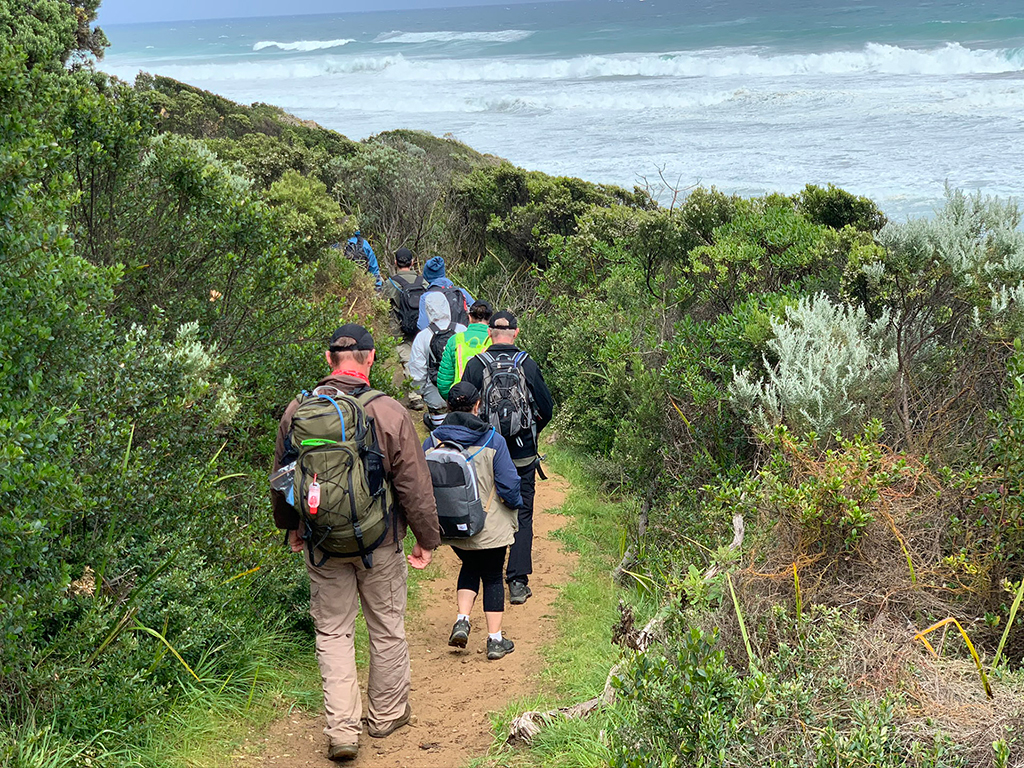
Great Ocean Walk, raised over $125 000 to support
brain research.
NFIA Trekkers do the hard yards for QBI
Through the hard work of Brian Davies, a successful businessman and immediate past-president and patron of the National Fire Industry Association (NFIA), and his wife, Liz, QBI was the joint-recipient of a donation of over $250 000 in 2019.
This incredible effort was the result of the NFIA Patron’s Walk held in October, which may sound like a scenic walk in the park but Brian, Liz and seven other NFIA members spent three days enduring driving rain and winds of close to 50 knots coming straight from Antarctica.
The idea for the walk came while the couple were completing the Three Capes Walk to raise money for the Queensland Brain Institute in 2018.
On that walk, Liz suggested to Brian that as the patron of the NFIA, he could create his own walk for charity. Mr Davies believes that corporate Australia has a big responsibility to give back, which is testament to the success of the inaugural walk. The money raised was shared between the Queensland Brain Institute and the Gallipoli Medical Research Foundation (GMRF).
The NFIA walk is the first of three walks to raise money for research at QBI and GMRF, with the aim of raising $500 000 in three years. The donation from the NFIA walk will help QBI’s research into motor neurone disease, dementia, Parkinson’s disease, stroke and QBI’s Discovery Research Endowment fund, which enables fundamental research into major health issues, including depression, anxiety, PTSD and epilepsy. QBI is extremely grateful to Brian and Liz and the NFIA team for their support.
The NFIA walk is the first of three walks to raise money for research at QBI and GMRF, with the aim of raising $500 000 in three years.
The Stafford Fox Medical Research Foundation
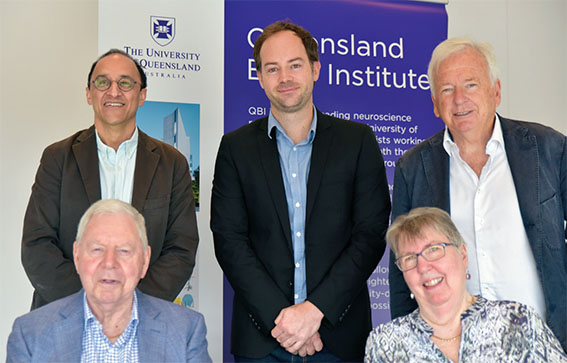
(QBI Director) and Dr Steven Zuryn and Emeritus Professor Perry Bartlett AO (back row).
In 2019, The Stafford Fox Medical Research Foundation confirmed its continued generous support of the prestigious $2.5 million philanthropically funded international fellowship to Dr Steven Zuryn at the Queensland Brain Institute to fight stroke-induced dementia, also known as vascular dementia. The Foundation also continues to support the work of Emeritus Professor Perry Bartlett’s research into prevention of dementia in ageing by improving cognition through exercise.
The Stafford Fox Medical Research Foundation was established in 2013 following the death of Moyna Fox, and named in honour of her late husband, James Stafford Fox, a former BP Australia chief executive.
Stafford and Moyna Fox started one of Australia’s wealthiest medical research foundations after many years of careful planning, resulting in a fund worth over $100 million. It was only publicly revealed in Moyna’s will when she died in 2013, many years after her husband.
James Stafford Fox was a private person, tall, physically imposing, but without a, particularly dominant personality. He rose from a position as a junior clerk at the Port Melbourne depot of the Commonwealth Oil Refineries (COR) in 1932, to become the first Australian chief executive of BP Australia Ltd in 1971.
James Stafford Fox spent three years at the helm of BP Australia, and retired in 1974 at age 60, remaining on several boards until 1985. By 1990, he was in poor health, suffering, among other things, from dementia. He entered a nursing home and died in 1994. By that time, he had already charted the course that would lead to the establishment of the foundation. Moyna lived on for more than 18 years, knowing what would happen after her death, but never revealing it publicly. Eventually, she too succumbed to dementia and died in 2013. The couple, who were so careful with their money and who clearly had no desire for fame and prominence during their lifetime, will now forever be remembered for their generosity in setting up the Stafford Fox Medical Foundation.
The Foundation’s support of QBI is crucial in enabling Emeritus Professor Bartlett and Dr Steven Zuryn to continue their work in finding solutions for the growing challenge of dementia today. This cutting- edge research is helping put Queensland and Australia at the forefront of world medical research.
What your donations fund
Your support can help us achieve a range of achievements

World leading research

Brightest scientific minds

Solutions to global health challenges
"I think it is important for people with dementia, their families and carers, to know that they are not forgotten, and that there’s a lot of work going on behind the scenes at QBI to try to unravel the tangled web that is dementia."
– Robyn Hilton (established the Peter Hilton Senior Research Fellowship in Ageing Dementia)
Hear from one of our supporters
Jeff Maclean, Chair of QBI Advisory Board
Got a story you would like to share?
Are you a donor or supporter of QBI and would like to share your story? We would love to hear from you!
Research in action
- 16 Nov 2016Ilvana Dzafic, QBI, University of Queensland
SLRC
The Science of Learning Centre is a collaboration between two of Australia’s leading research institutes, the Australian Council for Education Research (ACER) and the Queensland Brain Institute (QBI).
Director
Professor Pankaj Sah
Director & Institute DirectorQueensland Brain InstituteCentre Director of The Asia-Pacific Centre for NeuromodulationAsia-Pacific Centre for NeuromodulationResearcher profile is public:1Supervisor:Researcher biography:Professor Pankaj Sah is Director of the Queensland Brain Institute (QBI) at The University of Queensland (UQ). He is renowned for his work in understanding the neural circuitry of the amygdala, an area of the brain that plays a central role in learning and memory formation. Dysfunction of the amygdala leads to a host of anxiety-related disorders. His laboratory uses a combination of molecular tools, electrophysiology, anatomical reconstruction, calcium imaging and behavioural studies to examine the electrophysiological signatures of different brain regions and their impact on disease. Recently, his laboratory has been working with patients undergoing electrode implantation for deep brain stimulation, which is used to treat a variety of disorders such as Parkinson's disease, Tourette's syndrome and essential tremor. Professor Sah trained in medicine at The University of New South Wales and, after completing his internship, gained a PhD from the Australian National University. Following postdoctoral work at the University of California, San Francisco, and UQ, he established his own laboratory at the University of Newcastle in 1994. He then joined the John Curtin School of Medical Research at the Australian National University as a group leader in 1997. He was recruited to QBI as a founding member in 2003, and has been Director since July 2015. Professor Sah has published over 110 papers in international peer-reviewed journals. He is also the Editor-in-Chief of the Nature Partner Journal npj Science of Learning, the first journal to bring together the findings of neuroscientists, psychologists, and education researchers to understand how the brain learns.
Body: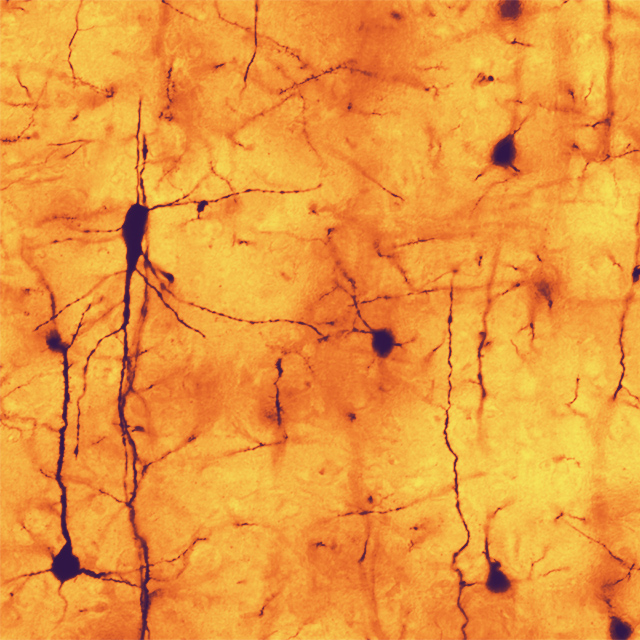 Professor Pankaj Sah: Synaptic Plasticity
Professor Pankaj Sah: Synaptic PlasticityThe Sah laboratory uses electrophysiology and molecular techniques, in conjunction with behavioural studies, to understand the neural circuitry that underpins learning and memory formation. Using animal models, the laboratory focusses on the part of the brain called the amygdala, and a Pavlovian learning paradigm called fear conditioning.
Researchers
Professor Jason Mattingley
NHMRC Leadership FellowQueensland Brain InstituteResearcher profile is public:1Supervisor:Researcher biography:Professor Jason Mattingley was appointed as Foundation Chair in Cognitive Neuroscience at the University of Queensland in January 2007, a joint appointment between the Queensland Brain Institute and the School of Psychology.
He completed a Bachelor of Science Degree with Honours at Monash University (1988), a Master of Science Degree in Clinical Neuropsychology at the University of Melbourne (1990), and a PhD in Psychology at Monash University (1995). In 1994 he was awarded an NHMRC Neil Hamilton Fairley Post-Doctoral Fellowship, which he took to the University of Cambridge. Here he worked jointly with Professor Jon Driver in the Department of Experimental Psychology and Professor Ian Robertson at the MRC Cognition and Brain Sciences Unit. While in Cambridge he was elected a Fellow of King's College.
Upon returning to Australia Professor Mattingley was appointed as Senior Research Fellow (later Principal Research Fellow) at the University of Melbourne, where he was Director of the Cognitive Neuroscience Laboratory within the School of Behavioural Science (2000 – 2006).
Professor Mattingley has won numerous accolades for his research, including an Australian Laureate Fellowship from the Australian Research Council (2012), the Distinguished Contribution to Psychological Science Award from the Australian Psychological Society (2012), and the Monash University Distinguished Alumni Award (Faculty of Biomedical and Psychological Sciences, 2016).
He was elected a Fellow of the Academy of Social Sciences in Australia in 2007, and a Fellow of the Association for Psychological Science in 2016.
Body: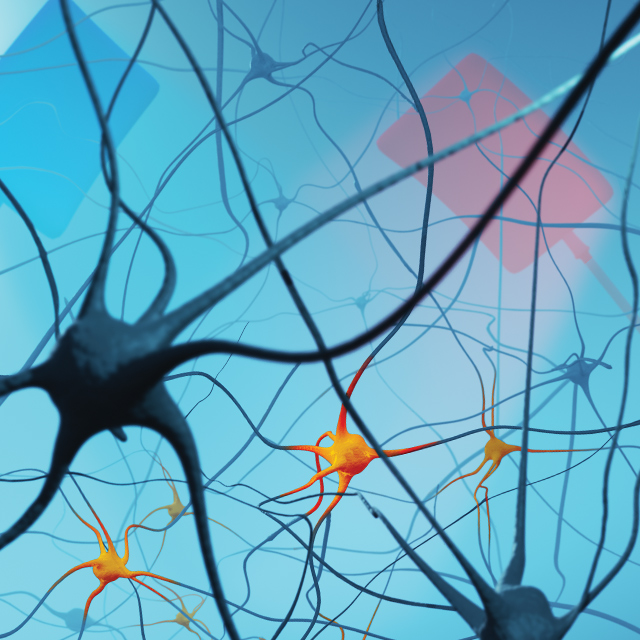 Professor Jason Mattingley: Cognitive neuroscience
Professor Jason Mattingley: Cognitive neuroscienceResearchers in the Mattingley laboratory seek to understand the roles played by selective attention, prediction and decision making in regulating perceptual, cognitive and motor functions in the human brain, in health and disease.
Professor Bruno van Swinderen
Professorial Research Fellow - GLQueensland Brain InstituteResearcher profile is public:1Supervisor:Researcher biography:Professor Bruno van Swinderen received his PhD in Evolutionary and Population Biology in 1998 from Washington University in St. Louis, Missouri. His graduate work was on general anesthesia in a Caenorhabditis elegans model, applying both quantitative genetics and molecular genetic approaches. For his postdoc at The Neurosciences Institute (NSI) in San Diego, California (1999-2003), he switched to Drosophila melanogaster to develop methods of studying perception in the fruit-fly model. He ran a lab at NSI from 2003 to late 2007.
Professor van Swinderen established a new laboratory at the Queensland Brain Institute in February 2008.
Bruno van Swinderen's group use Drosophila as a genetic model system to study mechanisms of perception in the brain and are interested in three phenomena: selective attention, sleep, and general anesthesia. Their focus is on visual perception and how it is affected by these different arousal states. Their current effort is in understanding how sleep regulates selective attention and predictive processing. Toward this goal, they use various novel visual paradigms in a Drosophila molecular genetics context. The lab is also focussed on understanding presynaptic mechamisms of general anaesthesia, with a view to uncovering new strategies to improve recovery from this common medical procedure.
Body: Professor Bruno van Swinderen: Drosophila behaviour and cognition
Professor Bruno van Swinderen: Drosophila behaviour and cognitionOur long-term vision is to understand how a brain produces subjective awareness. To achieve this long-term goal, we have focussed on understanding three brain states where awareness can be lost: general anaesthesia, sleep, and selective attention. During selective attention, we become unaware of objects outside our focus. How does that work? During sleep, the outside world is more broadly suppressed. Why is this necessary? Finally, during general anaesthesia, a bewildering array of drugs achieve the same, but deeper. By studying these three ways in which consciousness is lost, we hope to arrive at a better understanding on what is necessary for consciousness to exist – in any animal.
Honorary Professor Merrilyn Goos
Researcher profile is public:1Supervisor:Researcher biography:My research in mathematics education focuses on mathematical thinking, technology and mathematics learning, and mathematics teacher education.
Merrilyn Goos has worked in mathematics education for 25 years as a teacher, researcher, and teacher educator. She is a Professor in the School of Education, and from 2008-2012 was Director of the Teaching and Educational Development Institute at The University of Queensland. Previously she taught pre-service and postgraduate courses in mathematics education. Her research has been guided by sociocultural theories of learning in investigating metacognition and mathematical thinking, analysing pedagogical issues in introducing educational technologies into mathematics teaching and learning, and studying how communities of practice are established and maintained in secondary mathematics classrooms and teacher education contexts.
Support Staff
Ms Janet Voight
Executive AssistantQueensland Brain InstituteResearcher profile is public:0Supervisor:Location & availability:Works Monday to Thursday 9.00 am to 3.00 pmDr Stephanie Macmahon
Researcher profile is public:1Supervisor:Researcher biography:Dr Stephanie MacMahon is a Senior Lecturer in the Science of Learning and in Arts Education, teaching in both the ITE and post-graduate programs in the School of Education at The University of Queensland, and is the program coordinator for the newly established Science of Learning Field of Study. She has over 20 years’ experience as a P-12 educator and school leader, and draws on this experience to support her students in understanding how research can be used meaningfully in educational practice. Her constructivist philosophy underpinning her teaching also informs her approach to research, with two key focus areas that involve learning with and from others: human connection and learning, and knowledge mobilisation (translation) of research into practice.
Stephanie is also the Program Director of the UQ Learning Lab: a group of multi-disciplinary researchers, educators, and industry partners who collaborate to transform learning, teaching and training in diverse school and post-school contexts through the science of learning. Her research within the UQ Learning Lab aims to better understand the barriers and enablers to effective knowledge mobilisation in real-world teaching, learning and training contexts. This insight is then used to work with industry partners to develop, implement and evaluate contextually relevant, actionable, scalable and sustainable solutions to industry-identified teaching, learning and training needs.
Stephanie collaborates widely with multi-disciplinary researchers on science of learning projects using a range of methodologies.
- PhD student & Scientific Services Safety AdvisorQueensland Brain Institute

